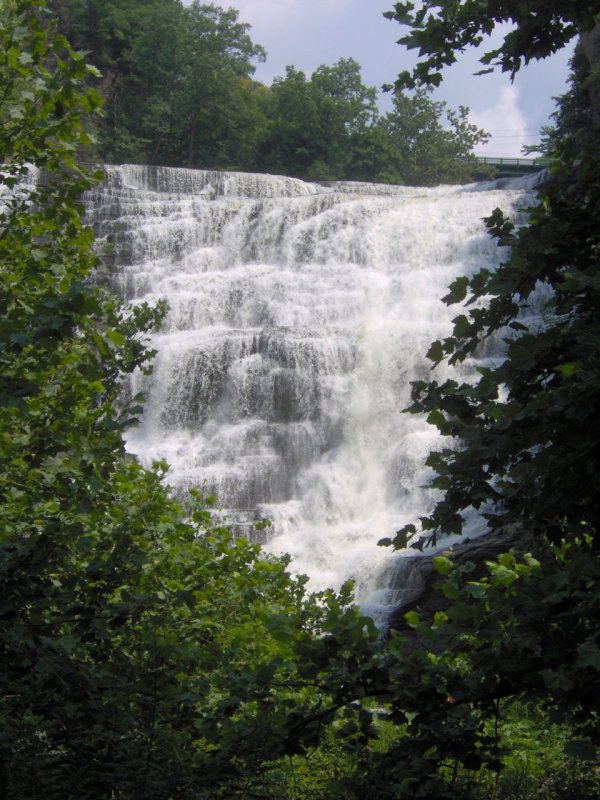Here is the start of a list of books, both fiction and nonfiction, that have an environmental subject matter.
Ecotopia by ERNEST CALLENBACH (Fiction)
From Amazon.com
"Ecotopia was founded when northern California, Oregon, and Washington seceded from the Union to create a "stable-state" ecosystem: the perfect balance between human beings and the environment. Now, twenty years later, the isolated, mysterious Ecotopia welcomes its first officially sanctioned American visitor: New York Times-Post reporter Will Weston.
Like a modern Gulliver, the skeptical Weston is by turns impressed, horrified, and overwhelmed by Ecotopia's strange practices: employee ownership of farms and businesses, the twenty-hour work week, the fanatical elimination of pollution, "mini-cities" that defeat overcrowding, devotion to trees bordering on worship, a woman-dominated government, and bloody, ritual war games. Bombarded by innovative, unsettling ideas, set afire by a relationship with a sexually forthright Ecotopian woman, Weston's conflict of values intensifies-and leads to a startling climax.
The Sheep Look Up by John Brunner (Fiction)
From Amazon.com
An enduring classic, this book offers a dramatic and prophetic look at the potential consequences of the escalating destruction of Earth. In this nightmare society, air pollution is so bad that gas masks are commonplace. Infant mortality is up, and everyone seems to suffer from some form of ailment. The water is polluted, and only the poor drink from the tap. The government is ineffectual, and corporate interests scramble to make a profit from water purifiers, gas masks, and organic foods. Environmentalist Austin Train is on the run. The Trainites, environmental activists and sometime terrorists, want him to lead their movement. The government wants him in jail, or preferably, executed. The media wants a circus. Everyone has a plan for Train, but Train has a plan of his own. This suspenseful science fiction drama is now available to a new generation of enthusiasts.
Stand on Zanzibar by John Brunner (Fiction)
From Amazon.com
There are seven billion-plus humans crowding the surface of 21st century Earth. It is an age of intelligent computers, mass-market psychedelic drugs, politics conducted by assassination, scientists who burn incense to appease volcanoes ... all the hysteria of a dangerously overcrowded world, portrayed in a dazzlingly inventive style.
The Wild Shore
The Gold Coast
The Pacific Edge by Kim Stanley Robinson (Fiction)
From Publishers Weekly
Robinson's science fiction triology set in Orange County, California, offers three different futures: the aftermath of nuclear war; a city of uncontrollable urban development; and life in a total, environmentally-conscious society.
Copyright 1995 Reed Business Information, Inc.
Guns, Germs, and Steel: The Fates of Human Societies by Jared Diamond (Nonfiction)
From Amazon.com
Winner of the Pulitzer Prize. In this "artful, informative, and delightful" (William H. McNeill, New York Review of Books) book, Jared Diamond convincingly argues that geographical and environmental factors shaped the modern world. Societies that had had a head start in food production advanced beyond the hunter-gatherer stage, and then developed religion --as well as nasty germs and potent weapons of war --and adventured on sea and land to conquer and decimate preliterate cultures. A major advance in our understanding of human societies, Guns, Germs, and Steel chronicles the way that the modern world came to be and stunningly dismantles racially based theories of human history. Winner of the Pulitzer Prize, the Phi Beta Kappa Award in Science, the Rhone-Poulenc Prize, and the Commonwealth club of California's Gold Medal.
Collapse: How Societies Choose to Fail or Succeed by Jared Diamond (Nonfiction)
From Amazon.com
In his million-copy bestseller Guns, Germs, and Steel, Jared Diamond examined how and why Western civilizations developed the technologies and immunities that allowed them to dominate much of the world. Now in this brilliant companion volume, Diamond probes the other side of the equation: What caused some of the great civilizations of the past to collapse into ruin, and what can we learn from their fates?
One With Nineveh: Politics, Consumption, and the Human Future by Paul and Anne Ehrlich (Nonfiction)
From Publishers Weekly
The Ehrlichs' provocative and eminently readable look at current environmental trends takes its title from Rudyard Kipling's poem "Recessional," which contrasts the pomp of the 19th-century British empire to the faded glory of Nineveh, the ancient capital of the Assyrian empire. The Ehrlichs (Betrayal of Science and Reason), both members of Stanford's department of biological sciences, look at the global problems of overpopulation, overconsumption, and political and economic inequity that threaten to make the world into a new fallen Nineveh.
Silent Spring by Rachel Carsons (nonfiction)
Amazon.com
Silent Spring, released in 1962, offered the first shattering look at widespread ecological degradation and touched off an environmental awareness that still exists. Rachel Carson's book focused on the poisons from insecticides, weed killers, and other common products as well as the use of sprays in agriculture, a practice that led to dangerous chemicals to the food source. Carson argued that those chemicals were more dangerous than radiation and that for the first time in history, humans were exposed to chemicals that stayed in their systems from birth to death. Presented with thorough documentation, the book opened more than a few eyes about the dangers of the modern world and stands today as a landmark work.--This text refers to the Hardcover edition.




